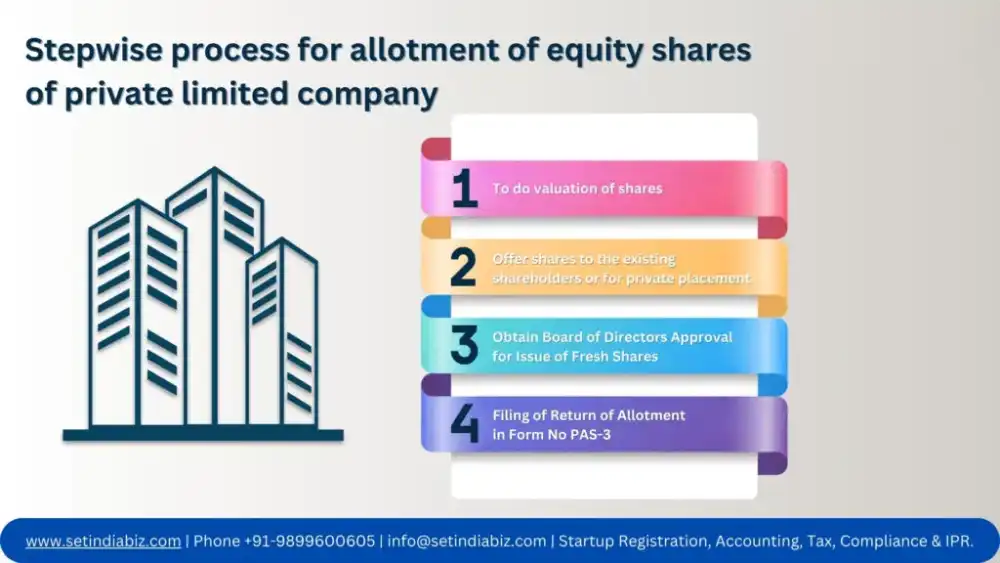Share Allotment in Private Limited Company
Overview : To achieve any long-term objective or vision, a private limited company requires sufficient funds; issuing new equity shares is the best possible way to raise funds. The new equity shares of the company can either be allotted at the fair market or even the premium, the issue of shares at a discount is prohibited by the Companies Act, 2013. This blog sheds light on the stepwise process for the allotment of equity shares of a private limited company in India.
As per the Companies Act, 2013 there are two ways by which a company can raise its funds. It can be done through the private placement of shares and rights issue of shares. It is important to know that a private company can either issue shares to its existing or current shareholders by the method of the rights issue or provide them bonus shares.
The first method of allotting shares i.e. private placement of shares implies the sale of securities to a small group of selected investors with the purpose of increasing capital. Usually, mutual funds, banks, pension funds, and insurance companies invest in the private placement of shares. It has to be taken care that during the private placement of shares, the invitation to subscribe securities should not be made to more than two hundred persons in aggregate in a financial year.
The second method of allotting shares i.e. Right issue of shares refers to the issue of rights to the existing shareholders of the company. It allows them to buy additional shares directly from the company in proportion to their current holdings, within a set period of time.
Under the right issue of shares, a company can issue shares on a preferential basis and can also issue sweat equity shares. Sweat Equity Shares refers to the equity shares, issued by a company to its employees or directors at discount or for consideration, other than cash.
The directors of the company are authorized to arrange funds for the company. For short-term funds needed, they normally resort to the loan or short-term credit facilities.
However for long-term use or to achieve the long-term vision and objective of the company, the issue of a new equity share is the best option. The new equity shares can be allotted at the fair market value or the premium, the issue of shares at a discount is prohibited by the companies act, 2013.
Stepwise process for allotment of equity shares of private limited company

- To do valuation of shares: To decide on the new limit of the authorised capital, or say alteration of the capital clause of the MOA directors must meet in a legally convened board meeting. The notice sent to directors must contain the agenda of the meeting, and we suggest including the proposed resolution so that the directors come prepared. We strongly recommend following the standards prescribed by ICSI in SS-1 for board meetings.
- Offer shares to the existing shareholders or for private placement: The existing shareholders of the company have the first right to any issue of shares. In case the shares to be issued do not get fully subscribed by the existing shareholders then the directors can approach other investors. Being a private limited company, the shares can not be offered to the public, and there is a prohibition of advertisement of the same.
- Obtain Board of Directors Approval for Issue of Fresh Shares: To approve the allotment of new shares of the company, the director’s meeting is called, wherein the majority decides on approving the allotment of shares. The notice sent to directors must contain the agenda of the meeting, and we suggest including the proposed resolution so that the directors come prepared. We strongly recommend following the standards prescribed by ICSI in SS-1 for board meetings.
- Filing of Return of Allotment in Form No PAS-3: after the approval by the board of directors of the company, a return of allotment of equity shares is filed with the ROC in form No Pas-3. With the approval of the same by roc, the paid-up capital of the company stands increased.
Conclusion
A Private Limited Company can raise funds by private placement of shares and rights issue of shares. It can either issue shares to its existing/current shareholders using the method right issue or offer them bonus shares. Delving into the aforementioned stepwise process of allotment of equity shares of a private limited company can legitimately ensure smooth allotment of shares.
Author Bio

Editorial Team | in
Setindiabiz Editorial Team is a multidisciplinary collective of Chartered Accountants, Company Secretaries, and Advocates offering authoritative insights on India’s regulatory and business landscape. With decades of experience in compliance, taxation, and advisory, they empower entrepreneurs and enterprises to make informed decisions.
